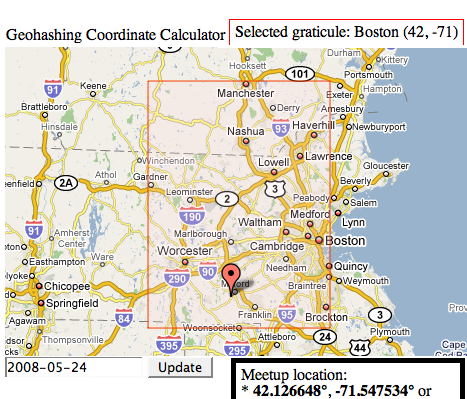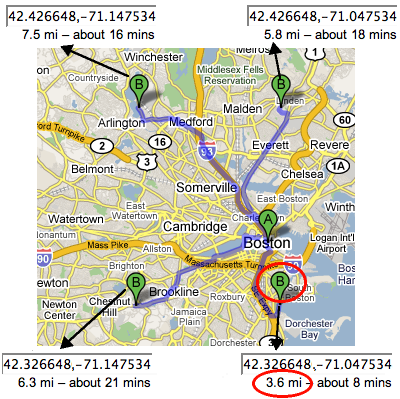Pinecone is a Boston based conifer.
An Immodest Proposal
The issue:
A typical hash is about 40 miles away from you. Ramifications of this:
- An hour's drive each way for those with car.
- Somewhat more problematic for those without.
- On the social front, you meet a lot of nice people but they live far away from you.
- Nobody is ever going to get the damn Couch Potato ribbon
You usually get sent to the countryside:
- Ironic to burn a lot of oil on behalf of going to see greenery.
- You often don't get to play with cities.
- In populated graticules you have to find a park to hang out. This is nice for frisbee but less handy for table games.
- Elsewhere you probably only end up with a hiking trip.
- It's a bigger problem for everyone in the winter.
Reasons I might like something nearer at hand:
- Lacking transport
- Want a local group to socialize with
- Want to play with cities
- The regular hash is someplace god-awful
- I am feeling lazy
Obviously we could just divide up the graticules into smaller pieces, but this would scatter the children of XKCD far and wide. I present a solution that might handle these issues.
Decicules and Driving Directions
- Divide each graticule into tenths called Decicules. For example, if today's offset is (.1357,2468) then some decicules near me are
(42.0357,-71.0468)
(42.1357,-71.0468)
(42.0357,-71.1468)
(42.1357,-71.1468)
(42.2357,-71.0468)
etc. - Pick the urban center you are closest to, say Boston. Use Google Directions to find the decicule which has the shortest distance driving directions from "Boston".
- The end point for that set of Google Directions is today's "Boston decicule hash".
This will generally result in a location within 6 miles of the city center. It doesn't matter where Google Maps thinks "Boston" is, or that you won't be driving the route it finds. What matters is that it's consistent for everyone who checks it.
This system is intended to solve one additional problem. When a hash is inaccessible, there can be confusion about where people should meet up. When you give Google Directions an inaccessible destination, it gets as close as it can using public roads. That endpoint will be unique and accessible.
An Example
| On 5-24-08 the meet up was at 42.126648,-71.547534: | Meanwhile, back in Boston: |
So in this case, those who can get out to the graticule go to the hash in Hopedale, MA while those more local could meet up at 695 William J Day Blvd, Boston which is where the driving directions for the winning decicule finish. Best to mention who has what plans on the graticule board ahead of time.
In a graticule with high population there might be several active decicules. Around here one would expect Boston, Worcester, and Nashua to have their own contingent. These locations being overridden if the graticule hash itself was nearby.
A little complicated but an implementation will help and you only need this for urban areas were population density makes submeet ups feasible.
Notes
Naming conventions: boston grat, bost dec
You can use any location. the boston decicule will sometimes go to then same location as a Brookline decicule, sometimes not. only if a lot of people.
The decicule location can be used as a fallback for everyone if the graticule location is going to suck. if the decicule location is also going to suck, you can pick the one with 2nd shortest driving distance, etc. You would name the decicule locations Boston1, Boston2, Boston3, etc. "Today's graticule hash is in the middle of a swamp but Boston3 is in the hardware department at Sears. Let's go there!"
During weekdays i'm certainly not be able to road trip, but it would be great to meet people at Boston1 at, say, 8pm.
All this is not meant to detract from the pre-eminance of the mighty graticule
Pick up more people who generally don't go on road trips for any of the above reasons.
Issues
The "dangerous areas" problem.

